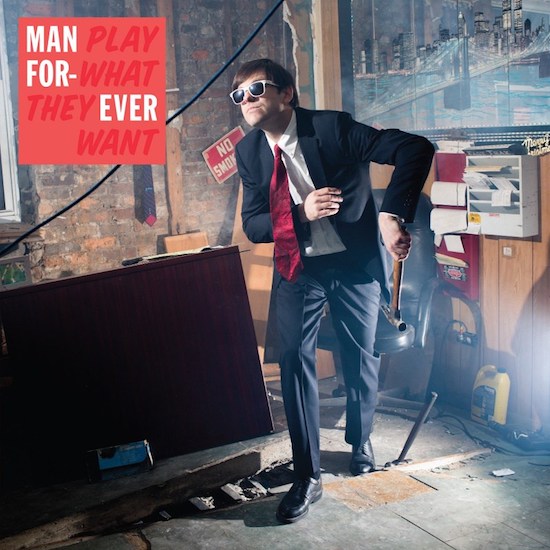Man Forever’s Play What They Want is undeniably a New York record. As big apple juicy as the paintings of Keith Haring, Steve Reich’s ‘Electric Counterpoint’ and Frank O’ Hara’s lunchtime reveries; Sonic Youth’s Daydream Nation and Laurie Anderson standing on a slowly melting block of ice. It’s all fire escapes and hydrants, poetry bookshops and gloopy yellow mustard from encrusted squeezy bottles. It’s a last missive from the Atlantis of bohemia, now sunk under gentrification, rising rent and zero-tolerance policing. A beacon from the semi-submerged peaks of what a city was and a daydream of what it should be.
For the last twenty years John Colpitts – Man Forever’s majordomo and the constantly broiling furnace of rhythm behind NY avant-rock mainstays Oneida – has acted as a living weathervane of committed artistry, lending his intimidating drum skills to everyone from White Hills to the Boredoms, bent on practice and improvement and mutation. To Colpitts the work is what matters and that commitment is stitched into every second of Play What They Want (a title as pithy and tricky as anything O’Hara himself could have come up with).
Colpitts’ city has always been a site of artistic miscegenation – Graffiti artists in the downtown galleries, Debbie Harry squeezing the handle of a boombox, Madonna at William Burroughs’ birthday party – so it makes sense that Play What They Want should be no different. Choirs and violins, horns lowing like downtown traffic, spiderish guitar scrawls and guest vocalists and behind it all the constant rumble and rapier flashes of Colpitts’ drumming. Skittish and urgent but locked tight into the groove, bringing to mind everyone from Max Roach to the now-departed Jaki Liebezeit. His percussion constantly tests at the fabric of the music, like he’s trying to fence his way out of its restrictions, burst out into the freedom of pure formlessness to achieve ecstatic lift-off.
Take opener ‘You Were Never Here’, its chopping, circular rhythm and a strutting double bass are almost self-consciously bohemian, evoking images of beret-clad hipsters clicking their fingers to Coltrane at the Five Spot, before the guest vocals from Yo La Tengo scud across the track like clouds through the beams of a sky scraper construction site. It’s undeniably odd, but it’s never awkward, and it hits greater heights when the choir and piano enter, glooping through the cracks in the track like molten, brittle candle wax. ‘Ten Thousand Things” mix of tender vocals and tin-pot gamelan suggest the work of Viking street corner visionary, Moondog, before a skronking guitar gouges deep rivets into the track leaving it to rattle its way home like a ghost parade.
Sometimes it doesn’t come off. ‘Debt And Greed’’s mixture of David Byrne-esque melody, Stax horns and System Seven-esque guitar twiddle is a step too far. It’s precious and whimsical where the rest of the record is as tough as cracked concrete. Luckily it’s the shortest track on the album at a mere three minutes, and serves as a palette cleanser for the two most ambitious pieces of music on Play What They Like – and probably the most thrillingly odd I’ve heard so far this year.
‘Twin Torches’ is a goddam masterpiece and the fulcrum around which the album swings. The wordless choir and seesawing violin sounding not unlike Sunn O)))’s ‘Alice’ if free jazz violinist Leroy Jenkins had crashed the session. Colpitts’ drumming thunders at a frequency that suggests Tony Allen at his least forgiving, building an iron throne from which Laurie Anderson herself – The Queen Of New York City, her voice as amused and compassionate as ever; Lady Galadriel sat in Central Park feeding the pigeons – gives a spoken word sermon: “What is my name?/Name one star”, she purrs. The title can’t help but bring to mind that most recent and cataclysmic of New York events, and it’s bought into sharp focus by a sudden eruption of Glenn Branca-esque clanging guitar and Colpitts’ drums lurching into gear like girders clattering to the ground, while Anderson’s violin teeters backwards and forward like a skyscraper during an earthquake.
‘Caternary Smile’ brings the album to a close, the choir stretching away from the complex, probing percussion like gum off a hot sidewalk. “I know that love is real and I know that death is real” intones a solitary voice, drifting past the orchestration while never quite landing among it, in a way that brings to mind the use of vocals on the most recent Oneida albums. It’s undeniably spiritual, whilst remaining rooted in the every day, like a chorus of hooded monks worshipping at a broken traffic light.
With Play What They Like Colpitts and Man Forever have crafted something truly unique: a spiritual jazz album for agnostics. Where Coltrane – and more recent voyagers such as Kamasi Washington and Hypnotic Brass Ensemble – look to the stars and the heavens for inspiration, Man Forever’s muse is grounded in the spit, brick and steel of their city. Play What They Like searches for glimpses of the infinite in the sunlight breaking through a tenement fire escape, in the brash horns of the morning traffic and the clatter of the trains on the ‘L’. But what makes it such a genuinely startling and unique record is what it finds there. Nothing less than miracles.


